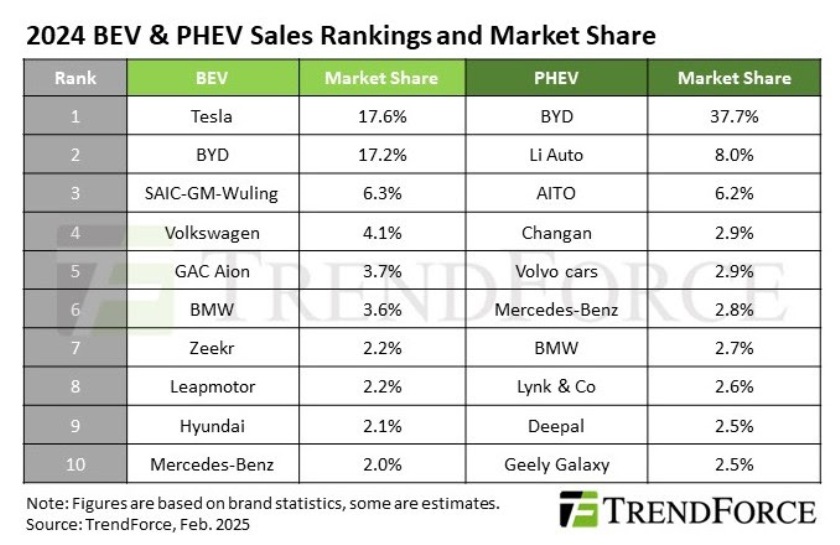TrendForce’s latest research indicates that global sales of New Energy Vehicles (NEVs), including Battery Electric Vehicles (BEVs), Plug-in Hybrid Electric Vehicles (PHEVs), and Fuel Cell Vehicles (FCVs), reached 16.29 million units in 2024, marking a significant 25 percent increase.
The Chinese market further solidified its dominance, expanding its share to 67 percent EV market. Looking ahead, global NEV sales are projected to grow by 18 percent in 2025, with China expected to maintain its upward trajectory. However, policy changes in the United States could introduce uncertainties that may impact overall market dynamics.
Tesla retained its position as the leading BEV manufacturer in 2024, with BYD closely trailing in second place. SAIC-GM-Wuling demonstrated remarkable growth, achieving a 44 percent year-over-year sales increase and reclaiming its position as the third-largest BEV producer.
Volkswagen and GAC Aion, ranking fourth and fifth, respectively, experienced negative sales growth, indicating challenges in maintaining momentum.
Meanwhile, ZEEKR and Leapmotor nearly doubled their annual sales, securing spots in the global top 10 BEV rankings for the first time.
Hyundai struggled in 2024, slipping to ninth place with a 21 percent decline in sales due to underperformance across key markets such as the United States, South Korea, and Europe.
In the PHEV segment, BYD dominated with a commanding 38 percent market share, which exceeded 40 percent when including its sub-brands. Li Auto, AITO, and Changan (including its Qiyuan sub-brand) secured second to fourth place, respectively.
AITO’s strong performance, largely driven by the success of the M9 model, propelled it into the global top 10 PHEV rankings.
BMW, once a stronger contender in the segment, saw a slight 3 percent decline in PHEV sales, placing it in seventh position. The widening gap between BMW’s BEV and PHEV sales further reflects shifting consumer preferences and market trends.
Geely Group also saw notable developments in 2024, with Lynk & Co and Galaxy entering the top 10 at eighth and tenth place, respectively.
In a strategic move, Geely integrated its brands by merging Geome into Galaxy and Lynk & Co with ZEEKR, forming ZEEKR Technology Group while retaining both brands within the newly structured entity.
TrendForce projects that global NEV sales will reach 19.2 million units in 2025, with China expected to sustain its growth, bolstered by the extension of the vehicle trade-in subsidy policy.
Despite the optimistic outlook, Chinese automakers face three key challenges: intensifying domestic competition, substantial investment requirements for overseas expansion, and increasing technological rivalry.
As a result, once fragmented multi-brand strategies are undergoing restructuring, with industry consolidation expected to continue in 2025. The likelihood of mergers among major automotive groups is growing, reflecting the need for stronger financial stability and technological advancements to compete in both domestic and global markets.
The US NEV market remains an area of uncertainty, with potential policy changes that could significantly impact growth. TrendForce warns that if President Trump successfully overturns the US$7,500 EV tax credit with congressional approval, the projected 18 percent growth rate for 2025 could drop to 16 percent.
However, the extent of the impact will depend on various factors, including the timing of policy implementation, state-level incentives, and automakers’ strategic responses to the evolving regulatory landscape. The global NEV market is poised for continued expansion, but geopolitical and economic shifts will play a crucial role in shaping the industry’s trajectory in the coming years.
Baburajan Kizhakedath


